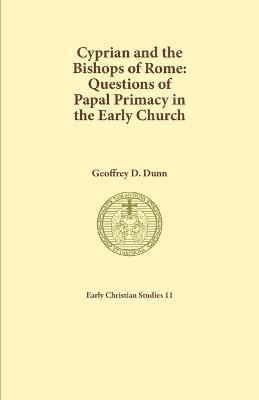Cyprian and the Bishops of Rome: Questions of Papal Primacy in the Early Church

Cyprian and the Bishops of Rome: Questions of Papal Primacy in the Early Church
During the ten years that Cyprian was bishop of Carthage (A.D. 249-258) there were five bishops of Rome (Fabian, Cornelius, Lucius I, Stephen I and Sixtus II). Cyprian's literary output deals with some of the most challenging issues faced by pre-Nicene Christianity: the Decian persecution and the problem of lapsed Christians, and the subsequent so-called rebaptism controversy. This book investigates the history of Cyprian's interactions with, and attitudes towards, each of those Roman bishops. Many previous attempts at explaining Cyprian's point of view with regard to the role and position of the church of Rome have concentrated on Cyprian's use of terms like cathedra Petri, primatus, and ecclesia principalis in De unitate. This book argues that Cyprian's understanding of these terms and of papal primacy in general is best determined from the wider context of his actual interactions with the bishops of Rome, as illustrated in his letters.
After a thorough re-examination of Cyprian's treatises and letters, it is concluded that Cyprian often regarded the support of the Roman church as crucial for him to manage the affairs of his own church in Carthage and the other churches of North Africa, because Rome was a large, prestigious and influential church. However, Cyprian's disagreement with a number of Rome's positions reveals that he did not believe it had a jurisdictional primacy over churches outside its own prouincia. Cyprian's ecclesiology was a collegial one where frequent letter-writing and synodal gatherings were the means by which decisions could be reached and implemented.
PRP: 284.68 Lei
Acesta este Prețul Recomandat de Producător. Prețul de vânzare al produsului este afișat mai jos.
256.21Lei
256.21Lei
284.68 LeiLivrare in 2-4 saptamani
Descrierea produsului
During the ten years that Cyprian was bishop of Carthage (A.D. 249-258) there were five bishops of Rome (Fabian, Cornelius, Lucius I, Stephen I and Sixtus II). Cyprian's literary output deals with some of the most challenging issues faced by pre-Nicene Christianity: the Decian persecution and the problem of lapsed Christians, and the subsequent so-called rebaptism controversy. This book investigates the history of Cyprian's interactions with, and attitudes towards, each of those Roman bishops. Many previous attempts at explaining Cyprian's point of view with regard to the role and position of the church of Rome have concentrated on Cyprian's use of terms like cathedra Petri, primatus, and ecclesia principalis in De unitate. This book argues that Cyprian's understanding of these terms and of papal primacy in general is best determined from the wider context of his actual interactions with the bishops of Rome, as illustrated in his letters.
After a thorough re-examination of Cyprian's treatises and letters, it is concluded that Cyprian often regarded the support of the Roman church as crucial for him to manage the affairs of his own church in Carthage and the other churches of North Africa, because Rome was a large, prestigious and influential church. However, Cyprian's disagreement with a number of Rome's positions reveals that he did not believe it had a jurisdictional primacy over churches outside its own prouincia. Cyprian's ecclesiology was a collegial one where frequent letter-writing and synodal gatherings were the means by which decisions could be reached and implemented.
Detaliile produsului










